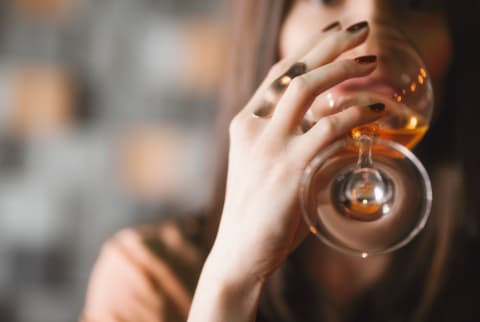Advertisement
Coffee 'Till Cocktails: How Yo-Yoing Between Caffeine and Alcohol Affects Your Health


We've all seen the T-shirts and knick-knack signs emblazoned with the alliterative slogan "coffee 'till cocktails." It's not just a cute saying—it's a reality for many who bounce back and forth between the stimulating effects of coffee and the sedative effects of alcohol. Though it may feel like these beverages are a lifeline for getting you through the challenges of your day, yo-yoing between caffeine and alcohol can come with some downsides.
Here’s what experts say happens to your body when you ride the rollercoaster of coffee ‘till cocktails.
Caffeine & alcohol aren’t a good mix for mood
The reasons for sipping caffeine and alcohol are pretty obvious: caffeine perks us up when we need energy (and is packed with a suite of healthy polyphenols), and alcohol calms us down when we’re ready to unwind. But the opposing effects of these two substances aren’t great for our mental well-being.
“Caffeine and alcohol work against each other. Caffeine is a stimulant, and alcohol is a depressant,” explains dietitian Sarah Pflugradt, MS, RDN. When you put your body through the cycle of up, then down, then up again, you swing between unnatural extremes. “If you are consuming both during the day, you are setting yourself up for multiple ups and downs in energy, and possibly mood, throughout the day,” she says.
In fact, according to addiction expert Peter Piraino, LMSW, LCDC, of Burning Tree, an addiction treatment center in Dallas, your mood could take a major hit from ping-ponging between venti lattes and mega-martinis.
“The use of stimulants in close succession with depressants can lead to anxiety, depression, caffeine psychosis, and alcohol poisoning,” he says. “This is not to say one coffee in the morning and one drink at night is bad. But rather, the extreme use of caffeine followed by drinking to excess can have severe negative health effects.”
Yo-yo-ing between them could impact your sleep & energy levels, too
Besides affecting your mental health, a yo-yo-drinking habit could harm your physical well-being. Pflugradt says that regularly ingesting high amounts of caffeine and alcohol can lead you to develop a tolerance to either (or both), causing you to ratchet up your intake. When you do so, you could easily sip past the recommended amounts.
Everyone has a different sensitivity to caffeine, and overshooting your personal limits could cause anxiety and jitters. And, of course, overconsuming alcohol is associated with seriouss health problems1 like cirrhosis of the liver and heart disease.
Not to mention, “Switching right over to alcohol [from caffeine] means that you haven't given your body time to clear the caffeine, which may mask the depressive effects of alcohol, meaning you may drink more than you intend. Doing this repeatedly or daily may set you up for dependence or alcohol abuse,” Plugradt notes.
Drinking coffee too late in the day could also impact your sleep and lead to a vicious cycle of needing more caffeine to stay awake and alert the next day, Pflugradt notes. Then, too, despite alcohol’s reputation as a put-you-to-sleep downer, drinking has been shown2 to cause more frequent nighttime waking.
So, while you might think relying on java first thing in the morning and wine at night is helping your natural rhythms, Plugradt says that’s not really the case.
Piraino agrees that a coffee ‘till cocktails lifestyle could turn out to be risky. "If either are used for a prolonged period of time, regularly and in excess, dependence can develop.”
Finding a better balance
If you’re ready to get off the merry-go-round of caffeine and alcohol, finding a better balance is absolutely possible. To boost your energy naturally, Pflugradt recommends focusing on your hydration, sleep, and activity levels. If you're currently drinking coffee first thing in the morning, waiting 1-2 hours to have your first cup can give your body more time to wake itself up naturally and help you crave less caffeine in the afternoon.
Without excessive caffeine, your body will be better able to relax on its own without the need for alcohol. And if you really aren’t ready to go zero-proof at happy hour, try a small portion of healthier alcoholic drinks like low-ABV beer or a spritzer of half wine and half sparkling water. Avoiding alcohol in the 4-6 hours before bed will also make it less likely to disrupt your sleep.
The takeaway
Many people rely on coffee and alcohol for energy, alertness, and stress reduction throughout the day. While both can be okay in moderation, becoming too dependent on them can lead to mental and physical health issues. Hop off the coffee-to-cocktails bandwagon by being more mindful of your caffeine timing, finding other ways to increase energy levels, and stopping drinking earlier in the day to keep your sleep in good shape.

Why Nutrition Is Key To Changing Your Relationship With Alcohol
Brooke Scheller, DCN, CNS

Why Alcohol Sabotages Your Gut Health & How To Get Back On Track
Brooke Scheller, DCN, CNS

Why Nutrition Is Key To Changing Your Relationship With Alcohol
Brooke Scheller, DCN, CNS

Why Alcohol Sabotages Your Gut Health & How To Get Back On Track
Brooke Scheller, DCN, CNS

Why Nutrition Is Key To Changing Your Relationship With Alcohol
Brooke Scheller, DCN, CNS

Why Alcohol Sabotages Your Gut Health & How To Get Back On Track
Brooke Scheller, DCN, CNS

Why Nutrition Is Key To Changing Your Relationship With Alcohol
Brooke Scheller, DCN, CNS

Why Alcohol Sabotages Your Gut Health & How To Get Back On Track
Brooke Scheller, DCN, CNS














